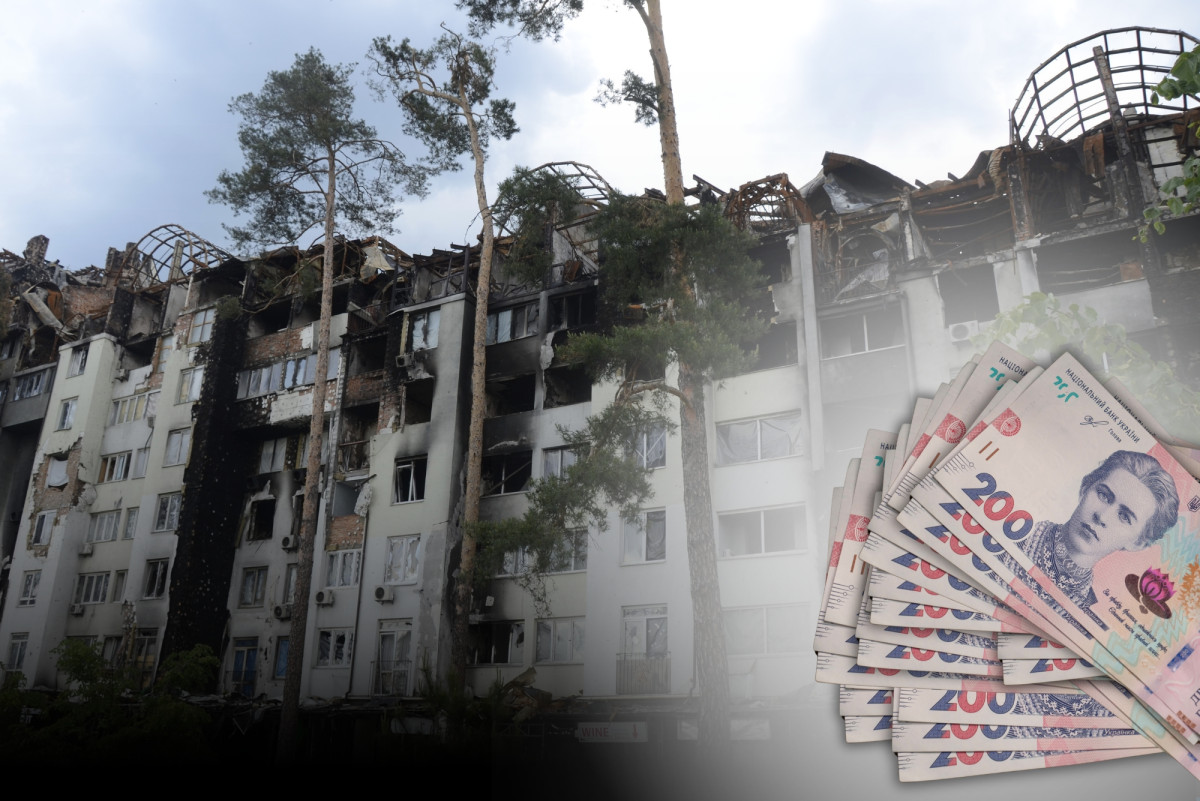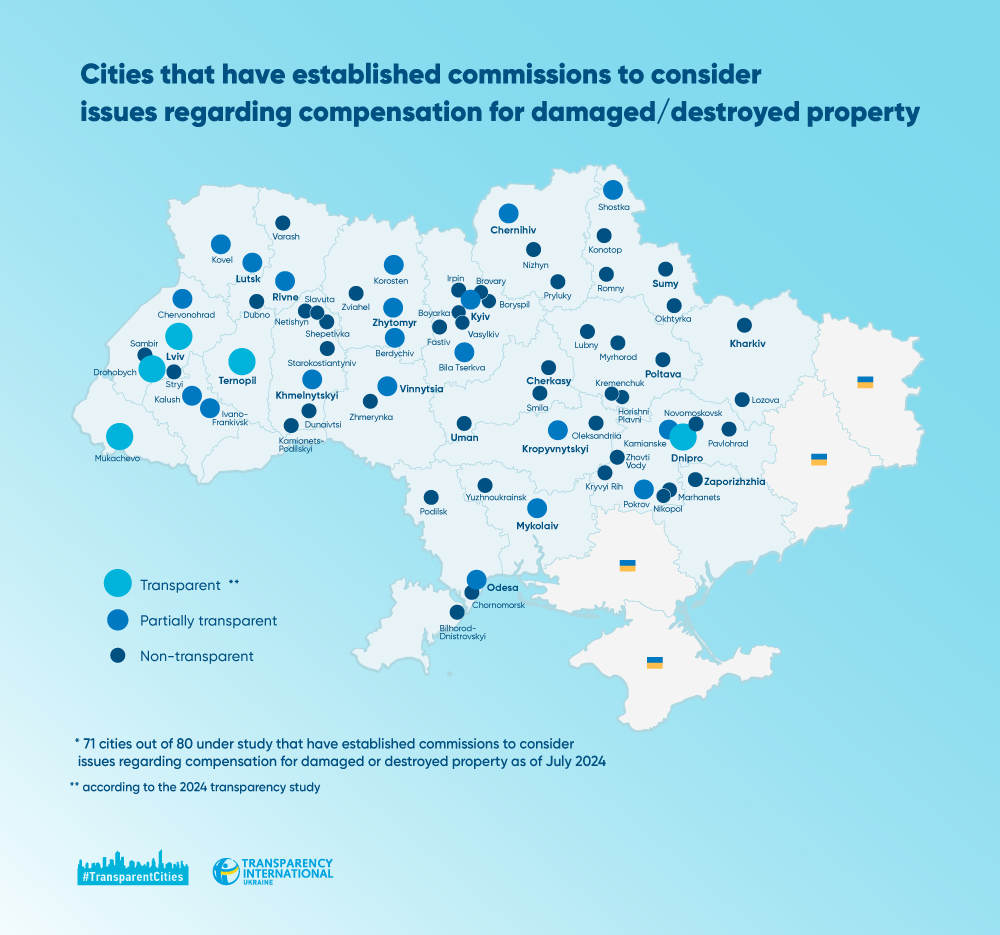

The Transparent Cities program verified whether all the studied city councils had established commissions to consider compensation for damaged or destroyed property. Nine municipalities have not yet created such commissions. Only in 47 cities out of 80 under study can citizens receive compensation for destroyed housing.
The second year of the full-scale invasion was not easier than 2022. The enemy continued shelling our cities and destroying houses and infrastructure. According to the Kyiv School of Economics, the housing stock suffered the most: direct losses from the destruction of these facilities are estimated at USD 58.9 billion. As of January 2024, more than 250,000 buildings had been damaged or destroyed. Every day, the scope of destruction grows.
As part of the city council transparency study for 2023, the Transparent Cities program analyzed how cities overcame wartime challenges. In particular, analysts checked whether municipalities had established commissions to consider issues of compensation for damaged or destroyed property and how they informed citizens about the activities of those commissions. Notably, the creation of commissions is provided for by the law of Ukraine and resolutions of the Cabinet of Ministers. We cannot stress enough the importance of the operation of such commissions in the third year of the full-scale war because they are responsible for assessing the damage caused by Russia and providing financial assistance to the owners whose property was damaged or destroyed.
For the first time, the program studied their activities in January 2024 and found that 68 cities out of 80 under study had established commissions to consider issues of compensation for damaged/destroyed real estate.
In the summer, analysts conducted an additional check and found that two more city councils—those of Kalush and Lutsk—took a step in this direction. In Poltava, there is no decision to establish a commission on the official website, but documents were published, according to which the executive committee approved the May and June decisions of such a commission in June 2024. Therefore, it can be concluded that the commission does function there.
So, there are 2 regional centers left—Uzhhorod, Chernivtsi, and 7 other cities in different regions of the country—Vyshneve, Volodymyr, Izmail, Kolomyia, Novovolynsk, Pervomaisk, Svitlovodsk—that published no information on the establishment of a commission. If the lack of commissions in Uzhhorod and Chernivtsi is easily explained by the security situation, there are a number of questions to Izmail, Pervomaisk, and Svitlovodsk city councils, which, due to shelling, need to compensate citizens for damaged or destroyed property.
As of July 2024, within the 70 cities under study (except Kryvyi Rih), the following commissions were established:
- one commission to provide compensation for damaged/destroyed immovable property in 24 cities;
- one commission to compensate for damaged objects in 24 cities;
- one commission to compensate for destroyed objects in 3 cities;
- two commissions (one commission responsible for damaged objects, another one—for destroyed objects) in 18 cities;
- two commissions (one commission responsible for destroyed objects, another one—for damaged/destroyed objects for whatever reason) in 1 city (Vasylkiv).
In Kryvyi Rih, commissions were created at the district level, so the city has:
- two commissions (one commission responsible for damaged objects, another one — for destroyed objects) in 4 districts;
- one commission to compensate for damaged/destroyed objects in 2 districts;
- one commission to compensate for damaged objects in one district.
Thus, in 68 cities, commissions have to resolve the issue of providing compensation for damaged property, and 47 cities have a need to compensate for destroyed objects.
In the course of the study, analysts noticed that some city councils made errors in official documents as well as on the pages of official websites dedicated to the operation of commissions. Sometimes these errors were made within the framework of the decision to establish a commission; sometimes there were differences in the names of commissions in documents and on websites; somewhere, the executive committees approved the decisions of the commissions, confusing their names. Therefore, the Transparent Cities program appealed to these local self-government bodies with personalized recommendations for correcting the mistakes and inaccuracies that made it difficult for citizens to control the activities of commissions.
In addition to the fact of commission creation, the program checked how citizens were informed about its activities. According to the legislation, authorized bodies must publish information on the results of commission meetings (the number of applications considered, decisions taken by the commission, etc.) on the official website.
The analysis indicates that the most complete information on the decisions to provide compensation is presented on the websites of Vinnytsia, Sumy, and Chernihiv. These municipalities have created separate pages dedicated to the activities of the commissions, are constantly updating data on the total number of applications considered and the number of decisions taken to provide or refuse to provide compensation. The decisions of the commissions in these cities are available as annexes to the decisions of the executive committees that approve them. Everyone can access the information about the amounts of compensation.
There are cities that are almost close to providing full information about the operation of commissions. There are still small steps to be taken. For example, the Central City District of Kryvyi Rih only needs to update well-structured data on the information page about the provision/refusal to provide compensation in a timely manner, as well as summarize the data so that users see the number of approvals or refusals. Similarly, the Zaporizhzhia City Council should not only provide lists of applications for which compensation has been approved or which have been denied compensation for damaged facilities on the eRecovery page, but also publish aggregated statistics.
There are many local self-government bodies where commissions were created back in 2023, but no obvious signs of their activities could be found. This list includes 18 cities: Berdychiv, Bilhorod-Dnistrovskyi, Varash, Vasylkiv, Dubno, Dunaivtsi, Ivano-Frankivsk, Kamianets-Podilskyi, Kovel, Mukachevo, Oleksandria, Podilsk, Pryluky, Rivne, Sambir, Smila, Ternopil, and Yuzhnoukrainsk. The users’ inability to find information may either be due to the fact that the city authorities do not publish details of the commission’s operation, or residents do not apply for compensation, or to the lack of quick and convenient access to the results of the commissions’ activities on the websites of city councils.
To introduce maximum transparency in this matter and provide residents with full information about how funds are spent on the restoration of property damaged or destroyed due to hostilities, the Transparent Cities program recommends:
- Creating a separate page on the city council website dedicated to the activities of commissions.
- Adding a reference there to the decision on the creation of commissions, approved regulations on commissions, their composition.
- Sharing information about the location of commissions, available means of communication with them.
- Constantly updating the page with statistics on the total number of applications considered, as well as on the number of decisions taken to provide or refuse to provide compensation.
- Publishing links to the decisions of the commissions indicating the amount of compensation on the page, or at least not forgetting to publish the decisions of the commissions as annexes to the decisions of the executive committees that approve them.
- Closely monitoring the correctness of the names of commissions in official documents and on the websites of councils.
Transparency and accountability, in particular in this matter, are important for both local authorities and society.
Adequate and quality publication of information on the operation of the commissions contributes to trust in local authorities, eliminates doubts about the decisions of the authorities, and reduces social tension.
The openness of the decision-making process allows residents to be sure that the commissions perform their duties honestly and fairly. Citizens have the right to know how authorized bodies operate and how common resources are used to compensate for losses. The owners will have the opportunity to verify the legality of the decisions and, if necessary, appeal them.
The Transparent Cities program calls on local authorities to be open and accountable in their activities and to engage in a constructive and honest dialogue with their community.
Transparency International Ukraine is an accredited chapter of the global movement Transparency International. Since 2012, TI Ukraine has been helping Ukraine grow stronger. The organization takes a comprehensive approach to the development and implementation of changes for reduction of corruption levels in certain areas. TI Ukraine launched the Transparent Cities program in 2017. It aims at overcoming corruption at the local level and promoting the best practices of transparency and accountability.
During 2017–2022, the program annually compiled the Transparency Ranking of the 100 Largest Cities in Ukraine. After the full-scale invasion started, the program launched a study of municipal transparency in the context of the large-scale war with Russia. In 2024, the team presented the second study evaluating 80 cities. 5 cities were recognized as transparent, 23 were partially transparent, the other 52 cities were recognized as non-transparent. The program develops quality analytics on various aspects of interaction between the authorities and citizens, transparency and accountability in Ukrainian cities; in particular, these include decolonization processes, housing policy, the state of open data at the local level, etc.







